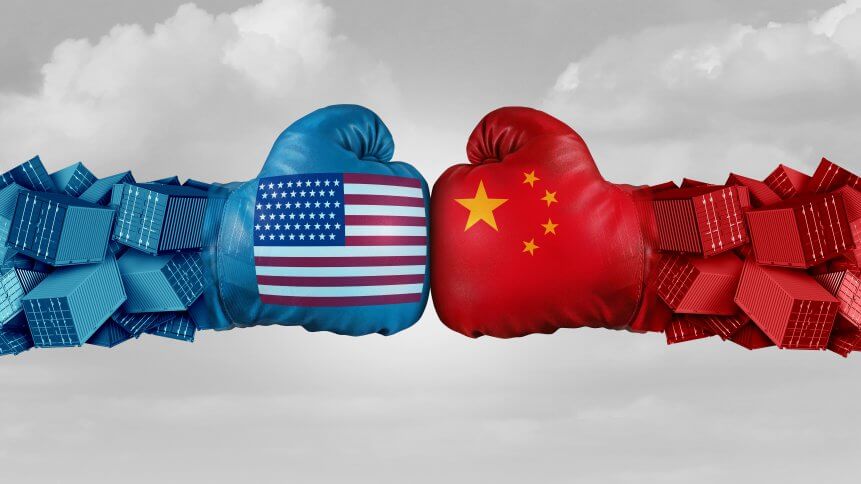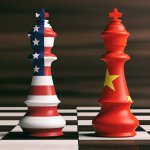US-China: The list of American companies that have retreated from China

- US-China relations are leaving American companies in the Chinese market worried – as they were when President Trump’s trade war peaked in 2019.
- In general, the foreign business community’s confidence in doing business in China continues to decrease, the latest AmCham China Flash Survey shows.
- We have gathered a list of American companies that have departed from the Chinese market.
For most of this year, the intense Covid-19 restrictions in China have been undermining confidence among US businesses operating in the world’s second largest economy. A survey by the American Chamber of Commerce in China (AmCham) earlier this year shows that nearly 60% of American firms surveyed are cutting revenue projections. Though the pandemic is partially to blame for this, the reality on the ground is far more complicated, mainly due to the US-China tensions that have worsened over the last four years.
For example, hen it comes to emerging market manufacturing know-how, reliability, currency stability, safety and promising domestic market growth, China is the place to be — a fact that is well known by the world. In fact, no country comes close in the developing world to China, and that is mainly why US companies are so headstrong about staying there. But the question remains — how much worse will the trade war get before American firms are forced to source elsewhere?
While there are still a significant number of American companies operating in China, many have signaled their intentions of downsizing or shifting away from China for better stability as US-China trade relations worsen. The shift is a response to growing concerns about the geopolitical tensions and pandemic-induced supply chain disruptions that have dominated operations in China in the last few years. For context, China has long been the world’s factory floor for high-tech electronics, unrivaled in its ability to secure legions of high-skilled workers and the production capacity to handle demand for the next ‘it’ device.
However, American companies in China are as worried now about US-China relations as they were when President Trump’s trade war peaked in 2019, according to AmCham’s survey. There may have been a brief “Biden bump” in sentiment, when relations seemed as if they might improve after President Biden’s inauguration a year ago, but that too has disappeared, the chamber found.
One of the biggest US tech giants in China, Apple Inc, has even begun planning to move a very small portion of its latest iPhone production to India instead in the wake of the recent deterioration in US-China trade relations. Similarly, part of Google’s newest Pixel phone production will be done in Vietnam. China is still, by far, the dominant consumer electronics manufacturer, but it’s not just smartphone production that is moving out of the country.
Apple has started producing iPads in northern Vietnam while Microsoft has shipped Xbox game consoles this year from Ho Chi Minh City. Amazon has been making Fire TV devices in Chennai, India. Several years ago, all of these products were made in China. Experts even foresee more companies would follow the lead of those tech giants and relocate their supply chain out of China.
But what about American companies that have moved out of China over the last couple of months? Let’s take a look at some of them.
US companies that have departed from China entirely
Uber is a prime example on how American tech firms struggle to succeed in Asia’s biggest economy. Despite spending billions on subsidies to attract customers and drivers, losses piled up too quickly for Uber. On top of that, in terms of operations, Uber ran into one too many hurdles. For instance, to avoid issues with China’s data localization laws, the company needed servers on Chinese soil.
Its navigation provider, Google Maps, also had limited accuracy in the country. This left Uber with no choice but to partner with Baidu, a Chinese tech company. Then came the final straw — a set of impending regulations which targeted the ride-hailing industry. Under those rules, Uber risked losing control of its data, and would need both provincial and national regulatory approvals for its activities.
As it was, Uber was running at a major loss, spending almost a billion dollars every year. The final straw was when the Chinese government banned all subsidies and drivers with less than three years of experience in order to regulate the industry. Uber realized that doing business in China was unsustainable, and by 2016, Uber had sold its assets to rival DiDi and took an 18.8% stake in the company.
Following Uber’s departure, scrutiny against tech companies, both foreign and domestic, intensified in China. The government gradually increased its grip on the tech industry, driving more US firms out of China, including Yahoo and LinkedIn, which is now owned by Microsoft.
Both Yahoo and LinkedIn announced their withdrawals in 2021, while being pretty clear about why they made the decision. Yahoo cited its commitment to a “free and open” internet, while LinkedIn says its decision was due to a “considerably more difficult operating environment and higher regulatory requirements.” Essentially, experts believe that the geopolitical tensions between the US and China will only further impede companies that generate data, an asset often seen as a national security concern. Those companies are almost certainly going to continue facing regulatory hurdles.
In June this year, in the latest retreat by a US tech company there, Amazon Inc. announced the closure of its Kindle digital bookstore in China, after halting sales of Kindle devices to retailers in the country. This is despite China being the biggest market for Amazon’s Kindle devices. In general, Amazon has struggled to make headway in the country, although e-commerce is very popular with Chinese consumers. Local competitors such as Alibaba and JD.com capitalized on their supplier networks and understanding of Chinese consumers to gain market share, before Amazon could even acquire a foothold.
To conclude, as the Center for Strategic and International Studies (CSIS) puts it, the US and Chinese economies have become so intertwined over the last 40 years that when Trump first launched his trade war, the idea of decoupling seemed absolutely impossible. “Even the restrictions on Huawei looked like a pebble of decoupling in an ocean of connectivity,” it said.










